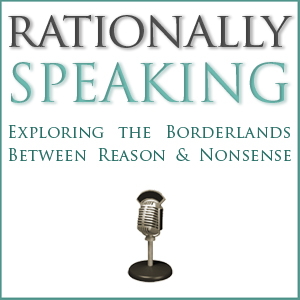Rationally Speaking #107 - MOOCs
Rationally Speaking Podcast
New York City Skeptics
4.6 • 787 Ratings
🗓️ 4 May 2014
⏱️ 49 minutes
🧾️ Download transcript
Summary
Transcript
Click on a timestamp to play from that location
| 0:00.0 | Rationally speaking is a presentation of New York City skeptics dedicated to promoting critical thinking, skeptical inquiry, and science education. |
| 0:22.6 | For more information, please visit us at NYC Skeptics.org. |
| 0:30.7 | Welcome to Rationally Speaking, the podcast where we explore the borderlands between reason and nonsense. |
| 0:40.4 | I am your host, Massimo Pilucci, and with me as always is my co-host, Julia Galev. |
| 0:45.1 | Julia, what are we going to talk about today? |
| 0:47.8 | Well, Massimo, today we're going to focus on the frontier of alternatives to higher education. |
| 0:55.2 | Oh, like alternative medicine or something in education? |
| 0:58.2 | No, wait, that's different. |
| 0:59.3 | That's a different kind of alternative. |
| 1:00.6 | Sorry. |
| 1:01.3 | No, no, not that. |
| 1:03.2 | Not that one. |
| 1:04.4 | So we're going to be talking partly about MOOCs, short for massive open online courses, where anyone can enroll and watch |
| 1:14.5 | video lectures from professors and then do their coursework online. And other alternatives as |
| 1:20.1 | well that have sprung up, like General Assembly, for example, where people go and take |
| 1:25.8 | six to 12-week courses on a specialized |
| 1:29.8 | thing that they think they need for their career, as opposed to getting sort of a generalized |
| 1:33.7 | college degree. So I kind of want to start actually by just laying out what I think the benefits |
| 1:43.6 | of the standard higher education |
| 1:45.1 | model are. And then maybe that'll make it easier for us to talk about to what extent we think |
| 1:49.7 | these alternatives are actually good substitutes. After all, these are supposed to be alternatives. |
| 1:54.1 | So yes, alternatives to what? Right, exactly. So I think the sort of naive way of looking at the benefit of a college education is that it gives you human capital. So it gives you improvements in your knowledge and your skill set that will make you a better employee and or a better citizen of the world or of your society, right? |
... |
Please login to see the full transcript.
Disclaimer: The podcast and artwork embedded on this page are from New York City Skeptics, and are the property of its owner and not affiliated with or endorsed by Tapesearch.
Generated transcripts are the property of New York City Skeptics and are distributed freely under the Fair Use doctrine. Transcripts generated by Tapesearch are not guaranteed to be accurate.
Copyright © Tapesearch 2025.

